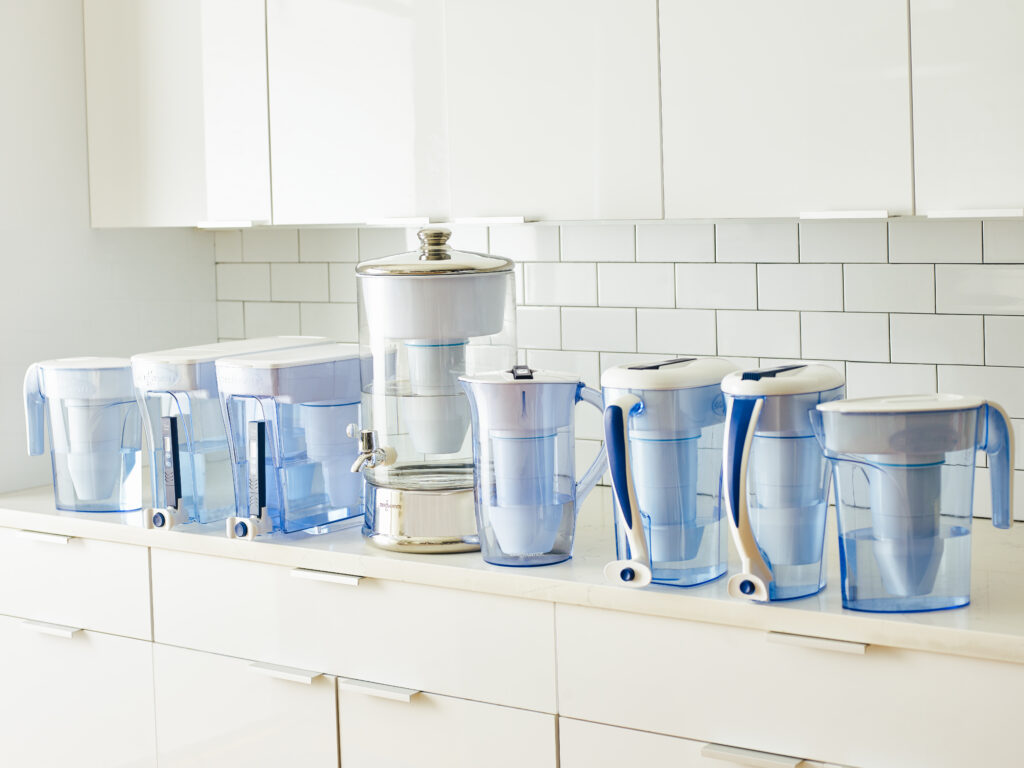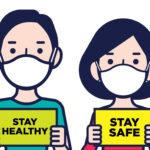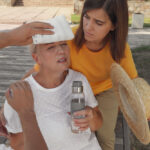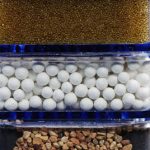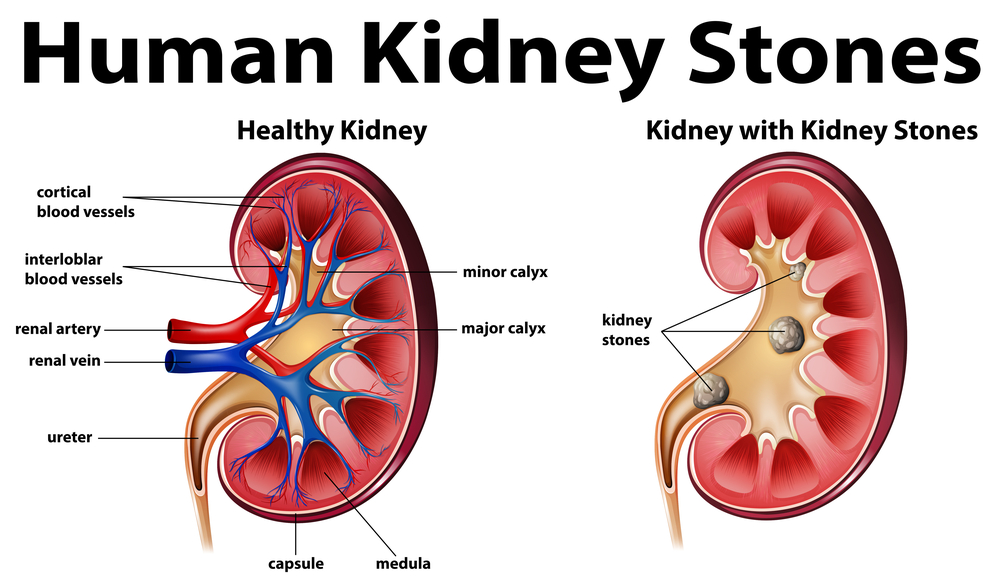
Avoid Kidney Stones – Stay Hydrated!
Mayoclinic explains kidney stones are hard deposits made up of minerals and salts which form inside the kidneys. Kidney stones may also form in the ureter, the tube that connects the kidneys to the bladder. According to the NHS prevalence is quite high, with more than 1 in 10 people affected during their lifetime. Kidney stones can be very painful and can lead to complications if left untreated.
Kidney Stone Symptoms
The most common symptoms of kidney stones is severe pain in the side of your abdomen or groin. This pain has been described as one of the most severe types of pain imaginable.
Other symptoms may include:
- High temperature
- Blood in the urine (hematuria)
- Nausea and vomiting
- Fever and chills (if an infection is present)
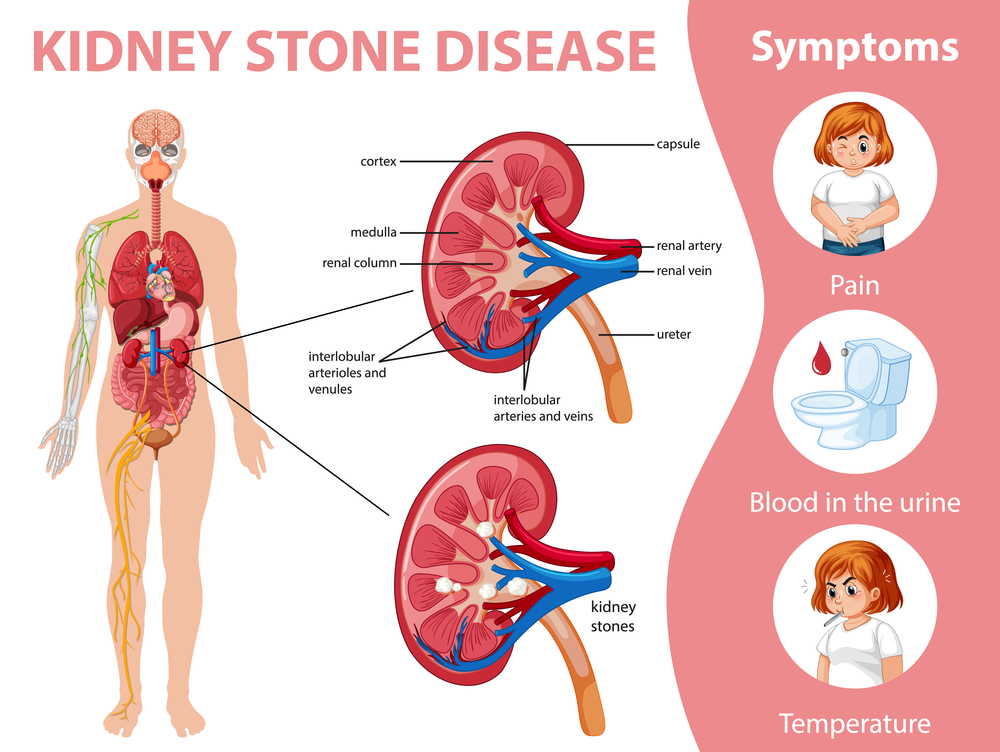
Kidney stones disease and symptoms infographic
Kidney Stone Complications
As the function of the kidneys is to clear the blood of toxins and excess fluids and transform the waste into urine, it is important to seek medical attention if you think you may have kidney stones.
If left untreated, they can cause several complications, including:
- Persistent pain in the side and back, below the ribs, which may vary in intensity
- Kidney stones can obstruct the flow of urine, leading to an infection in the urinary tract.
- Hematuria
- In severe cases, kidney stones can block the urinary tract, leading to an inability to urinate. This is a medical emergency that requires prompt treatment.
It is important to seek medical attention if you think you may have kidney stones. Early treatment can help prevent complications and reduce the risk of the stones recurring.
Kidney Stone Prevention
The NHS explain the best way to prevent kidney stones is to ensure you avoid becoming dehydrated by drinking plenty of water each day. This will help to keep your urine clear, inhibiting waste products from becoming too concentrated and forming stones. The National Kidney Foundation report kidney stone rates are rising in the UK. They urge people to consider drinking higher volumes of water, especially if attending saunas, hot yoga, or partaking in heavy exercise due to loss of hydration via sweating.
Hard Water Areas
Whilst water appears clear, it contains total dissolved solids (TDS), which refers to the total concentration of dissolved ions, such as minerals, metals, and salts, present in water. The concentration of specific minerals creates the “hardness” of water. Some people in the UK live in hard water areas, which is defined by Healthline as water containing a higher amount of calcium and magnesium. Senguptu (2013) adds that hardness can also be caused by other dissolved metals, such as aluminium, barium, strontium, iron, zinc, and manganese.
Can Hard Water Cause Kidney Stones?
There has been some debate over whether hard water may contribute to the risk of developing kidney stones. Willis et al (2019) report that hard water increases calcium levels in urine, however, this may only be a significant factor if you have already experienced kidney stones and want to take steps to prevent re-occurrence. Michael and Somani (2022) state,
“The dissolved mineral content of drinking water can modify a number of excreted urinary parameters, with potential implications for kidney stone disease (KSD)… Tap water mineral content varies significantly across the United Kingdom. Depending on where one lives, drinking 2–3 L of tap water can contribute over one-third of recommended daily calcium and magnesium requirements, with possible implications for KSD incidence and recurrence.”
Regardless of soft and hard water areas, the current health recommendation maintains that drinking plenty of water and avoiding dehydration is the main preventative measure for kidney stones.
ZeroWater
ZeroWater uses a 5-stage filtration process, which removes 99.6% of TDS contaminates from tap water, including calcium and magnesium. ZeroWater uses Ion Exchange Technology, leaving you with pure water which tastes fantastic! Sound good? Try ZeroWater today for a truly purified hydration experience.
References
- Michael, K, G, F, T., & Somani, B, K. (2022). Variation in Tap Water Mineral Content in the United Kingdom: Is It Relevant for Kidney Stone Disease? Journal of Clinical Medicine, 11, 5118.
- Sengupta, P. (2013). Potential Health Impacts of Hard Water. International Journal of Preventive Medicine, 4(8), 866-875.
- Willis, S, Goldfarb, D., S, Thomas, K, & Bultitude, M. (2019). Water to prevent kidney stones: tap vs bottled; soft vs hard – does it matter? BJUI International, 124(6), 905-906.

